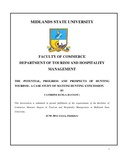Please use this identifier to cite or link to this item:
https://cris.library.msu.ac.zw//handle/11408/2442Full metadata record
| DC Field | Value | Language |
|---|---|---|
| dc.contributor.author | Banga, Cathrine | - |
| dc.date.accessioned | 2017-06-30T13:49:14Z | - |
| dc.date.available | 2017-06-30T13:49:14Z | - |
| dc.date.issued | 2014-06 | - |
| dc.identifier.uri | http://hdl.handle.net/11408/2442 | - |
| dc.description.abstract | The study sought to determine the Potential, progress and prospects of hunting tourism at Matetsi Hunting Concession. The research sought to ascertain the state of hunting, determine the challenges associated with hunting, determine the progress of hunting and assess the potential and prospects of trophy hunting at Matetsi hunting concession. It also sought to produce recommendations that may enhance tourism at Matetsi hunting concession. A literature review addressed the history of trophy hunting, its arguments for and against and also noted the benefits to the concession and the sector of tourism. Several studies noted that a generalised research had been done on the conservancy and sustainability of the trophy hunting as well as challenges of trophy hunting in Southern Africa.The exploratory research design was used in this study; the study was tackled using both the qualitative and quantitative methods. In this regard the targeted population was Matetsi Hunting Concession. To come up with a sample of the study, the researcher adopted non-probability sampling techniques. Convenience and judgmental sampling was used to target respondents from the concession. The sample size comprised of concession managers, marketing managers, hunting guides and officials from the Zimbabwe Parks and Wildlife Management Authority (ZPWMA). Data was collected using interviewer administered questionnaires and telephone interview guides. Nine questionnaires were administered to the hunting guides or rangers in Matetsi hunting concession, a telephone interview guide was used to collect data from the ZPWMA officials and semi structured interview questions were used to collect data from the marketing and concession managers in the concession. The researcher used thematic and descriptive analysis techniques in data analysis. Findings revealed that business had been steady in Matetsi Hunting Concession post 2009. There was a rising interest in hunter tourist visitors from South Africa and Mozambique as a result of the suspension of hunting in Botswana and Zambia. Challenges facing Matetsi concession included poaching and climatic changes. There was concern over the high number of elephants in the area which had destroyed the vegetation of the concession. The research recommended that Matetsi hunting concession increase its marketing techniques to promote more travel to the area and noted the need to deploy more anti poaching units in the area. The researcher noted the need for government intervention to help sustain communities there by reducing poaching which has been as a result of poverty. Waver of bans on importing ivory to USA may reduce poaching and black market operations. | en_US |
| dc.language.iso | en | en_US |
| dc.publisher | Midlands State University | en_US |
| dc.subject | Hunting tourism. | en_US |
| dc.title | The potential, progress and prospects of hunting tourism. A case study of Matetsi Hunting Concession. | en_US |
| item.languageiso639-1 | en | - |
| item.fulltext | With Fulltext | - |
| item.grantfulltext | open | - |
| Appears in Collections: | Bachelor Of Commerce Tourism And Hospitality Management Honours Degree | |
Page view(s)
350
checked on Feb 13, 2026
Download(s)
232
checked on Feb 13, 2026
Google ScholarTM
Check
Items in MSUIR are protected by copyright, with all rights reserved, unless otherwise indicated.




